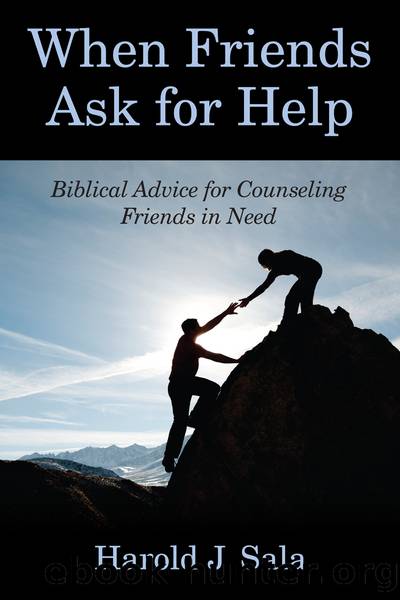When Friends Ask for Help by Harold J. Sala

Author:Harold J. Sala
Language: eng
Format: epub
Tags: Friends give serious life advice to one another more than all of the world’s psychiatrists, psychologists, and counselors combined. And that’s good; there’s no doubt God calls us to help and encourage other people.
ISBN: 9781433679384
Publisher: B&H Publishing Group
Published: 2013-03-15T00:00:00+00:00
BIBLICAL ALTERNATIVES
Follow the principles of Scripture.
Relate humans to God and thus accept scriptural guidelines for interpersonal relations.
Human beings are responsible and can change. Recognize sin and forgiveness.
Changed character promises the hope of a better future.
Lead to change.
Have I been too hard on secular disciplines? I am not suggesting that all non-Christian counselors have nothing to offerâbut I am saying that philosophical models that leave God out do not offer solutions that go to the heart of human problems. Humanityâs deepest troubles all stem from the areas where we have gone outside the will of God.
Some people, who basically follow the moral model, have indeed helped many people. They come close to the biblical model of counseling, but they stop just short of what the Bible actually says about responsibility and grace. For example, Dr. Thomas Szasz, sometimes called the âanti-psychiatric psychiatrist,â has for many years denounced the irresponsibility of psychoanalysis, which he considers to be an endless search to hang responsibility on something or someone else. And he is not alone. For at least twenty years before his death in 1983, 0. Hobart Mowrer denounced the psychoanalytic theories of Freud. He called for increasing the power of conscience, and spoke of âa very present hell on this earth, the hell to which unexpiated sin and guilt lead us.â
Garth Wood, the outspoken critic of psychiatry (who, donât forget, is himself a psychiatrist), alleged that far too much credence has been given to the idea that people suffer from a disease that we call âneurosis,â just as people suffer from mumps or pneumonia. He contends that the medical model of mental illness (you are attacked by mental illness just as you would get a cold or the flu) has little, if any, validity. Neurosis is a myth, he says. Wood believes that psychological cure comes through first admitting wrongdoing, and then through atonement: doing something that rectifies the wrong and therefore leads to mental health. Yet Wood still stops short of biblical truth. Fuller Seminary professor H. Newton Malony, in reviewing his book, charged that Wood âseems far less interested in what is right than in what will work.â8
The contrast between the mentality of the secular person and the individual in whom dwells the Spirit of God is nothing new. Paul experienced this struggle in Corinth as he tried to communicate the difference that a personal knowledge of Jesus Christ really makes. Almost as though he were giving up trying to relate to the secular mind, he says, âThe natural man does not receive the things of the Spirit of God, for they are foolishness to him; nor can he know them, because they are spiritually discernedâ (1 Cor. 2:14).
What difference does this Christian mind-set make as we strive to help people?
Counseling in Cooperation with the Spirit of God
Biblical counseling is God-centered. Most secular counseling is human-centered and deals with âfelt needs.â The temptation for the Christian who has been trained in a secular environment is to keep humanity at the
Download
This site does not store any files on its server. We only index and link to content provided by other sites. Please contact the content providers to delete copyright contents if any and email us, we'll remove relevant links or contents immediately.
Professional Troublemaker by Luvvie Ajayi Jones(28964)
Empire of the Sikhs by Patwant Singh(22172)
Twilight of the Idols With the Antichrist and Ecce Homo by Friedrich Nietzsche(17705)
Plagued by Fire by Paul Hendrickson(16636)
The Sun and Her Flowers by Rupi Kaur(13694)
Norse Mythology by Gaiman Neil(11883)
Adultolescence by Gabbie Hanna(8145)
A Journey Through Charms and Defence Against the Dark Arts (Harry Potter: A Journey Throughâ¦) by Pottermore Publishing(7940)
Fangirl by Rainbow Rowell(7834)
Wonder by R.J. Palacio(7732)
How to Bang a Billionaire by Alexis Hall(7412)
Crystal Healing for Women by Mariah K. Lyons(7376)
Becoming Supernatural by Dr. Joe Dispenza(7105)
Wonder by R. J. Palacio(7059)
Tools of Titans by Timothy Ferriss(6946)
The Road Less Traveled by M. Scott Peck(6634)
The Witchcraft of Salem Village by Shirley Jackson(6584)
The Lost Art of Listening by Michael P. Nichols(6473)
The Institute by Stephen King(6257)
